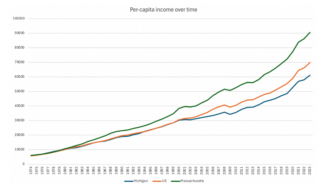Over the next several weeks, I’ll be writing a series of posts about the importance of educational attainment – both to our statewide economy and to individual economic mobility and prosperity – and how we should be designing our K-16 education system to increase the number of Michiganders who attain bachelor’s degrees.
This is the eighth post in the series. See links to previous posts below:
Post #1: Educational attainment and economic development
Post #2: Educational attainment and economic well-being
Post #3: College completion rates
Post #4: Beyond free college
Post #5: Developing writers in K-12
Post #6: Building college-ready skills in K-12
Post #7: An assessment system designed for college success
In my last post I discussed the ways in which our current K-12 assessment system is at odds with the development of college-ready skills, and the kinds of assessments that would actively encourage the development of college-ready capacities in our young people.
In this post I’m going to explore a second way we can center the capacities needed for college success in our K-12 system – namely, by holding K-12 systems accountable for their students’ postsecondary outcomes.
Whenever we’ve raised this idea in the past, we have been told that it’s impractical. We are told there are too many variables in a student’s life (family situation, socioeconomic status, postsecondary goals) for the high school to be held accountable for a student’s academic outcomes after they leave school.
But by not factoring postsecondary outcomes into our assessment systems, we are missing an opportunity to have schools honestly reflect on how their educational programs are preparing students, or not, for their postsecondary education, and what needs to change. Do students have the foundational math and reading skills to be able to thrive in their first-year courses? Do students get enough opportunities to practice writing substantive, evidence-based essays? Are students given opportunities to manage their own work and learning, as they’ll have to do in college? Are courses designed to build a deep understanding of the core concepts of various disciplines, that sets a foundation for future learning?
Shining a light on postsecondary outcomes would also underscore the importance of high schools’ college counseling programs, and overall college-going culture. The college application and financial aid processes are incredibly complex, particularly for first-generation students. And we know that where a student enrolls in college is incredibly important to their eventual success. One of the most important findings in the literature on college success is around the phenomenon now known as “undermatching,” where a student chooses to attend a school that is less selective than other colleges she could have gained admission to. This turns out to be important because a student who undermatches is less likelyto graduate than an observationally equivalent student who attends a more selective institution. This is because more selective institutions tend to have more resources, that they devote to financial aid and student supports, as well as the influence of higher-achieving peers.
Undermatching is that much more of a problem because it predominately occurs among low-income students, who could most benefit from the economic mobility impact of a college degree. The reason it largely occurs among low-income students is because most low-income students lack access to highly-qualified college counselors, who can provide expert advice on college match, the college application process, and financial aid. The national student to counselor ratio is nearly 400 to 1 – a figure that is much worse in under-resourced schools serving non-affluent students. It should also be noted that this high ratio accounts for all counselors –rather than solely college counselors – who must squeeze whatever college guidance they can among the traditional duties of a guidance counselor. If we hope to design a system that produces more college graduates, investments will be required to not only dramatically reduce student to counselor ratios in our schools, but also ensure college counselors are trained on how to use student success data to direct their students to the postsecondary institution that offers them the best chance of success.
This data is also readily available. The image at the top of this post is from the state’s MI School Data website, which provides a number of postsecondary reports by high school. From this data source one can see the postsecondary institutions graduating seniors from each high school in the state are enrolling in, and how many graduate with what credentials four, six, or eight years after graduating from high school.
I should note here what we mean by “held accountable.” When we say schools and school systems ought to be held accountable to postsecondary outcomes, we don’t mean it in the “high stakes” sense that we have become accustomed to, where a teacher’s job or even the existence of a school is dependent on student test scores. Rather, when we say postsecondary outcomes should be a factor in the K-12 accountability system, we mean that the underperformance of schools or school systems in postsecondary attainment should trigger additional supports – both financial resources and professional development resources – in educational design, instruction, college counseling, or whatever else a school might need in order to give their students a better shot at postsecondary success.
Because any major reform to our K-12 system will necessarily require additional funding, my next post in this series (and final one looking at the K-12 system), will look briefly at the state of funding in Michigan schools, and the funding increases that are required to design a system built to enable postsecondary success for all.







